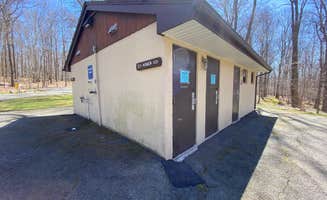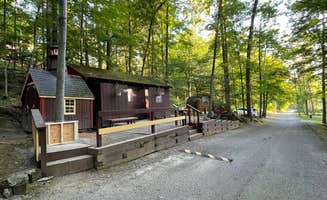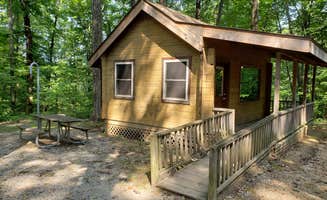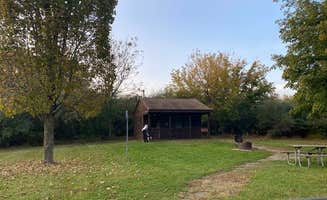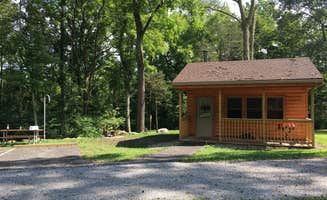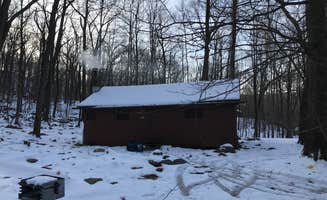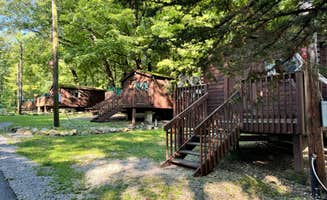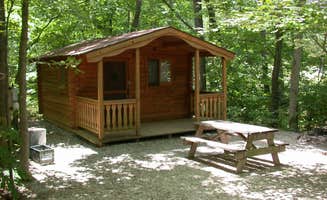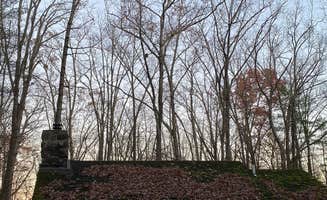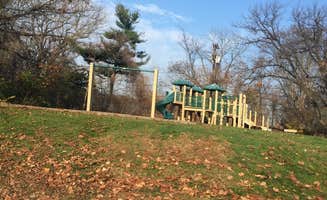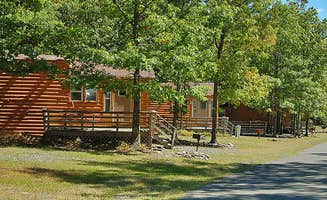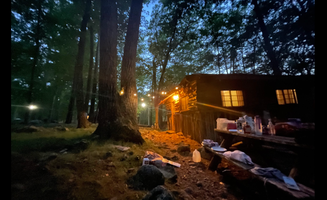Cabins near Brookside, New Jersey offer outdoor accommodations in the northwestern part of the state, situated within the Skylands Region where elevations range from 400 to 1,800 feet. This region experiences four distinct seasons with summer temperatures typically reaching the mid-80s and winter lows dropping below freezing. Most cabins require reservations at least two weeks in advance during peak season, with many campgrounds enforcing strict check-in times between 2-8 PM.
What to do
Hiking to scenic overlooks: At Jenny Jump State Forest, trails lead to panoramic views of the surrounding mountains. "We had hiking trails with beautiful views you could enjoy right from your campground. It's also close to other local hikes like Mt. Tammany," notes one visitor. The forest features multiple lookout points accessible via moderate difficulty trails.
Wolf preserve tours: Located at Camp Taylor Campground, the Lakota Wolf Preserve offers educational experiences. "The wolf preserve at the same location was just amazing - we learned so much and could hear the wolves howl from the campsite," shares a camper. Tours run twice daily on weekends and cost $15 for adults and $7 for children when staying at the campground.
Stargazing opportunities: Several cabin locations offer minimal light pollution for night sky viewing. "Great spot for stargazing. Owners are very nice," mentions a visitor to Mountainview Campground. Some cabins are positioned in clearings that provide unobstructed views of constellations, particularly during new moon phases.
What campers like
Diverse cabin layouts: Stokes State Forest offers varied cabin designs with specialized features. "I favored Cabin 8, the kitchen and bathroom were separated from the main room," reports one camper. Their rustic cabins typically include separate sleeping and living areas.
Proximity to water: Multiple cabin locations provide easy access to lakes and streams. "Our site was on the water and it was really nice. A duck visited us every morning," shares a visitor to Spruce Run Recreation Area. Waterfront cabins typically cost $10-15 more per night than standard units.
Wildlife encounters: The natural setting around cabins allows for wildlife observation. "We heard foxes fighting right outside our tent, the snorts of deer, and there were bats right above us all night making noise!" describes a camper at Mountainview Campground. Early morning and dusk offer the best wildlife viewing opportunities from cabin porches and windows.
What you should know
Varied bathroom facilities: Bathroom quality differs significantly between locations. "The bathrooms were absolutely disgusting. I thought with COVID they were cleaning them more, but for the entire weekend, someone's #2 remained all over the toilet, floor, and corner wall," warns a visitor to Spruce Run Recreation Area. Some cabins offer private facilities while others rely on communal restrooms.
Noise considerations: Some campgrounds experience noise issues from highways or other campers. "You can hear 78, especially at night once the campground settles down," notes a camper about Spruce Run. Sites further from main roads typically offer quieter surroundings.
Seasonal operation: Most cabin facilities close during winter months. "Our site was easily the nicest- all the way in the back with only one neighbor. It is so quiet here," reports a visitor to Mahlon Dickerson Reservation. Reservations for summer weekends should be made 3-6 months in advance due to limited availability.
Tips for camping with families
Kid-friendly activities: Panther Lake Camping Resort offers numerous recreation options for children. "Big campground, lots of sites, nice pool, big community hot tub, boating is great, good fishing, nice playground, basketball court and great amenities," explains one visitor. Activities typically run from 10 AM to 8 PM during summer months.
Security considerations: Family-oriented campgrounds typically provide regular security patrols. "Park employees and park police drive around through the day," mentions a camper at Spruce Run Recreation Area. This helps maintain quiet hours and ensures safety for younger campers.
Playground access: Multiple cabin locations feature playground equipment for children. "The welcome center has a store where you can buy essentials you may have forgotten and then some. There is an arcade room (fun for kids but kind of an odd thing to have at a campsite in my opinion)," notes a visitor to Panther Lake.
Tips from RVers
Site selection importance: RV sites vary significantly in quality and access. "If bringing your RV, the safest bet is to reserve a spot with no shade as the other spots often times have very low hanging tree limbs," advises a camper at Spruce Run Recreation Area. Most campgrounds require minimum 25-foot clearance for RVs.
Hookup limitations: Water and electric connections are not universal. "There is a section of RV spots that are each cut out in the woods so very private. Once you have backed into the spot and leveled out it's a good time," shares a visitor to Camp Taylor Campground. Partial hookups typically include 30-amp service and water, with dump stations available at campground exits.
Arrival timing: RV check-in procedures can be strict at some locations. "I reserved two nights, but the first night we were not going to be able to arrive until after 9. After talking to them, they would not allow us to come late, but did refund the first night," explains a camper at Mountainview Campground. Most campgrounds require RV arrivals before 8 PM due to quiet hours and limited lighting.


